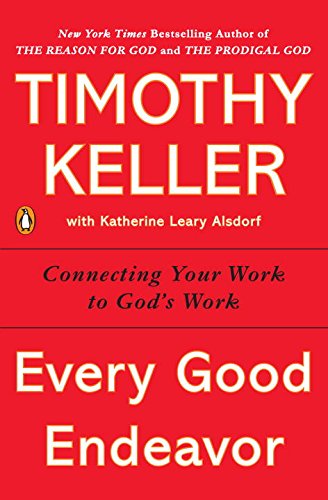Review by Ward Shope
 Have you ever awoken with no desire to go to “work”? Chances are, even if you have your dream job, you’ve had those mornings. Work seems meaningless, fruitless, maybe endless. It feels disconnected from the other areas of your life. Why do we do it? Is it just for a paycheck? Is it significant in any way? Does my faith in Christ relate in any way to my work other than as an opportunity to witness to my coworkers?
Have you ever awoken with no desire to go to “work”? Chances are, even if you have your dream job, you’ve had those mornings. Work seems meaningless, fruitless, maybe endless. It feels disconnected from the other areas of your life. Why do we do it? Is it just for a paycheck? Is it significant in any way? Does my faith in Christ relate in any way to my work other than as an opportunity to witness to my coworkers?
Tim Keller and Katherine Leary Alsdorf confirm that there is. But in order to understand work’s role in our lives, we have to go back to the beginning. Work was a part of the creation fabric. From the beginning, God gave us work as a gift – a gift to glorify Him, to love our neighbor, and to benefit society. We should find satisfaction in work well done. If we don’t get this straight, work will, like the author of Ecclesiastes says, be vain.
Since the fall of Adam and Eve into sin, there are all kinds of problems with work. Some of what’s wrong is us. We either tend to look at work as the thing that gives life meaning, identity and value, or we see it is a necessary evil. On the one hand, we idolize it, making it serve the role of God – which it cannot. On the other hand, it becomes drudgery, harsh and relentless.
But we aren’t the only thing wrong with work. Some forms of work crush the image of God in us. There appears to be little room for us to express the unique way that God has made us. Relationships stumble at work. The goal of work is often reduced simply to the accumulation of more goods, both for the company we work for, and for us as workers. We have a hard time seeing how what we do benefits the common good. Work demands get in the way of our relationships at home or our relationship with the Lord.
But the gospel redeems work. When we understand the gospel context of work, we find motivation to serve the Lord and others in it whether we manage or are managed by others. We begin to connect work with the rest of life and humanize it for others with us. Redeemed work may place us in ethical conundrums, but it also begins to glorify God in our lives.
Work will never be completely redeemed this side of the Kingdom. Keller re-tells the story of “Leaf by Niggle”, written by J.R.R. Tolkien at a time when Tolkien was struggling, as an illustration of how God takes our meager work and completes it. This encouragement is what we need to hear when we are struggling with our work. And when the Kingdom comes, work will find its satisfying and proper place in our lives.
The book contains a theology of work, clearly and engagingly shared from the perspectives of creation, fall, and redemption. The gospel is clearly shared and related to work. A couple of the later chapters spend time canvassing some philosophical thought, but it does not become intellectual and divorced from real life. It’s a great book to be read and shared.
